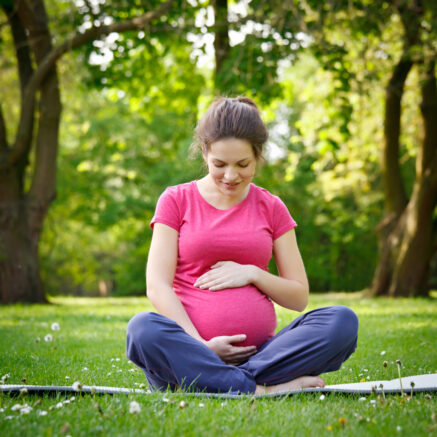Is Endometriosis Genetic? What Family History Tells Us
In this article:
You know how your mother struggled to get pregnant with you. It’s a story that has been told around your family for decades. The culprit was a disease called endometriosis, where the uterine lining grows outside the uterus.
This painful, chronic condition can make it difficult to conceive and cause many other health issues. And now you’re wondering ‘Is endometriosis genetic?’ Are you going to face the same challenges as your mother did?
They are reasonable questions, and they demand individualized care and attention. At Chapel Hill OBGYN, we realize that. Because scientists are learning so much about genetic connections to various diseases, we stay informed of the latest research.
While we have access to timely information just like larger medical practices, we also provide the personalized and compassionate care you would expect from a smaller practice. We provide the best of both worlds to offer the best in patient medicine. That’s why we’ve consistently been rated the best OBGYN practice in the Triangle area.
We’ll answer if Endometriosis is genetic and provide information on how our OBGYNs in Chapel Hill and Durham work with you to find solutions.
First, We’ll Get a Closer Look at Your Family’s Medical History
We believe that comprehensive medicine means looking into not only your medical history, but that of your relatives as well. Conditions such as high cholesterol and breast cancer can run in families, and knowing your risks enables us to be proactive about your health.
Researchers have discovered that endometriosis has a genetic component, and understanding your background enables us to reach an accurate and timely diagnosis.
Is Endometriosis Genetic?
Does Endometriosis Run in Families?
Yes, endometriosis can run in families, and genetics can play a role in why some women develop it and others do not. In fact, the University of Oxford completed an intensive research study that identified a gene, NPSR1, that increases the risk of developing endometriosis.
We Will Provide a Timely and Accurate Diagnosis
How We Determine If You Have Endometriosis
Typically, endometriosis can’t be felt or discovered from a regular pelvic exam. Sometimes it’s discovered through an ultrasound.
In certain cases, we may need to use a version of an ultrasound where a wand called a transducer may be gently placed inside your vagina in what is called a transvaginal ultrasound.
Another way we can diagnose endometriosis is through a procedure called a laparoscopy, which allows us to look inside your abdomen to see if there are signs of tissue growing outside the uterus. This is done under sedation so you won’t feel any pain or discomfort. A laparoscopy is minimally invasive, and provides us detailed information about the extent of your endometriosis.
Will I Get Endometriosis If My Mom Had It?
Not necessarily. As we discussed earlier in “is endometriosis genetic?” It is a major risk factor however, and makes you much more likely to develop it.
If you have a close relative–a sister, mother or aunt–who has had endometriosis, we urge you to discuss it with us.
How We Treat Your Endometriosis
Now that you’ve received a diagnosis, there’s one question pounding in your mind:
What next?
That depends upon several factors: we don’t believe medicine is “one size fits all.” We’ll tailor a treatment for you depending upon your background, medical history and whether or not you want to have children.
Hormonal Contraceptives
If you are not planning to get pregnant, hormonal contraceptives, like birth control pills, may be an option
Gonadotropin-releasing hormone agonist and antagonists
These medicines create an artificial menopause and cause the endometrial tissue to decrease. They’re not appropriate if you’re planning to have children.
Progestin therapy
This stops your period and therefore, halts the growth and development of endometrial tissue.
Aromatase inhibitors
These lower the estrogen in your body. Sometimes it’s used in conjunction with birth control pills or progestin.
But What If I Want to Become Pregnant?
Obviously, if you want to become pregnant, solutions that involve birth control or stopping periods would not be the right for you.
Sometimes, laparoscopic surgery is used to remove the endometrium that has grown outside the uterus, and this is often the best course of treatment if you want to become pregnant.
But as we mentioned earlier, we’ll have to review your medical history and your individual situation to be sure this is the right approach for you.
Are You Planning on Getting Pregnant? If You Have Endometriosis, We Can Help
Many of our patients wonder if they can get pregnant if they have endometriosis. While it is challenging, and endometriosis does affect fertility, we work with you to face these issues.

In fact, it may surprise you that many women can get pregnant with endometriosis, but this depends upon the stage of the disease. The further it advances, the harder it will be to conceive.
We’ll be able to diagnose what stage your endometriosis is and develop strategies if you’re coping with infertility. We have helped hundreds of area women who struggled to conceive have healthy babies.
We Help You With Other Issues Related to Endometriosis
Is it painful when you have sex? Endometriosis may be the cause. We know that a fulfilling love life is a vital part of a healthy and satisfying relationship. You should never be embarrassed to speak with us about any issues you’re having when it comes to intercourse.
We’re Concerned With Your Mental, As Well As Physical, Health
We know that the pain and frustration of endometriosis can take its toll. You may have experienced depression and anxiety.
Don’t worry. We’re here for you.
We’re always happy to listen, and we will even provide a referral to a certified therapist if you feel you need one.
Other Factors That Put You at Risk of Endometriosis
Examining your family history is important, but there are other factors that can place you at greater risk of developing endometriosis. These include:
We’ll also evaluate these when putting together a comprehensive picture of your health.
Are You Experiencing the Common Symptoms of Endometriosis?
We’ll check with you to see if you’re experiencing the most common symptoms of endometriosis, which are:
At Chapel Hill OBGYN, You Have the Best of the Triangle Working With You
Once again, we have continued our “winning streak.” Indy magazine has named us the “Best of the Best” of OBGYN practices in the Triangle.
We don’t take this accolade lightly. This accolade is only possible by truly being partners in your care.
We understand. If you have endometriosis, it affects all aspects of your life. You’re in pain. You’re stressed. You may even have issues with your sex life.
If you want a family, you may be consumed by worry that you won’t be able to get pregnant.
We’ve outlined some of the treatment options we offer for you. We invite you to experience firsthand the quality, patient-first care of Chapel Hill OBGYN. Contact us for an appointment.
This content is for educational and informational purposes only and should not be considered medical advice. For medical questions and concerns, please contact your healthcare provider.

